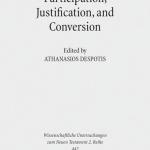We continue our discussion on Paul’s theology according the Eastern Orthodox tradition. This week we will cover works of the law, justification, and union with Christ, also known as participation “in Christ.” Once again, Athanasios Despotis will be our guide. Professor Despotis teaches New Testament at Rheinische Friedrich-Wilhelms-Universität, Bonn, Germany. He has academic publications in both in German and English. We will be focusing on his edited volume entitled, Participation, Justification, and Conversion: Eastern Orthodox Interpretation of Paul and the Debate between Old and New Perspectives on Paul, Wissenschaftliche Untersuchungen zum Neuen Testament 2/422 (Tübigen: Mohr Siebeck, 2017).

Part 2 of the Interview
Oropeza
Welcome back for another session, Professor Despotis! Our previous session focused on the New Perspective on Paul from an Eastern Orthodox point of view including covenantal nomism and faith.
Prominent scholars from the New Perspective on Paul have a unique interpretation of the “works of the law” that Paul presents as the antithesis of “justification by faith” (Galatians 2:16; 3:2, 5, 10; cf. Romans 3:20, 28). They interpret it in terms of ethnocentrism. It had nothing to do with human inability to keep the Torah, the Law of Moses, perfectly. Nor did the term pertain to alleged Jewish legalism, nor work-righteousness, nor “human effort” as such.
Rather, works of the Law for Paul (in Galatians) had to do with what set apart his Jewish-Christian opponents from the other nations, the gentiles. Circumcision, food laws, and “living like a Jew” (Galatians 2:14) became a means of imposing the law on Paul’s gentile converts. This is what Paul came against. His gentile converts did not need to follow such regulations to be right with God. In short, Paul wanted them to remain gentiles and not become Jews; their righteousness comes by faith, not “works of the law.” This interpretation highlights social and ethnic dimensions related to Paul’s congregations.
What is Eastern Orthodoxy’s interpretation of the “works of the law”?
Despotis
Concerning the syntagma ἔργα νόμου (“works of [the] law”) Eastern Orthodox interpretations do not regard Paul’s antithesis to the “works of the Law” as a polemic teaching against a synergistic soteriology* of Judaism.
As both the Greek Church Fathers and New Perspective believe, Pauline tradition presupposes a final judgment according to works (cf. Roman 2:6–11; 1 Corinthians 3:8; 2 Corinthians 5:10, 11:15).
Oropeza
I’m glad to hear this. Some theologians attempt to write off judgment according to works as simply hypothetical in Romans 2. Even if that were case (and I do not believe it is), it would still not explain the other passages you bring up, especially 2 Corinthians 5:10: “For all of us must be made fully known in front of the judgment seat of Christ in order that each one may receive recompense for the things in the body in proportion to what he or she has done, whether good or bad” (B. J. Oropeza translation in my Exploring Second Corinthians, RRA 3; Atlanta: SBL Press, 294). These good/bad deeds or “works,” attributed to believers in this passage (“all of us”), do not appear to be the same thing as “works of the law.”
Hence, it is hard to imagine that Paul is focused on “human effort” when coming against “the works of the law.” I am reminded of Philippians 2:12: “work out your own salvation with fear and trembling.” This verse cannot be explained away by Philippians 2:13; the latter verse cannot entirely erase 2:12 so that there is no human remainder in that verse!
Despotis
James Dunn has interpreted ἔργα νόμου (“works of the law”) as the commandments of the Sinai Torah which functioned as “identity markers” for Second Temple Judaism.** The opponents of Paul required them from gentile converts.
The Greek Fathers knew about the social function of the “works of the Law,” yet they do not stress it intensively in their writings. According to the exegetes of the Early Church, the main issue of Paul does not derive from an inclusivistic or exclusivistic interpretation of the Law. Rather, it derives from the fact that adhering to the “works of the Law” would signify a return to the pre-Christian situation. In other words, it would signify a return to the realm of slavery to death.
This ontological and Christocentric approach of the issue concerning the works of the Law is not supported by the New Perspective. On the contrary, Dunn considered faith in Christ to be complementary to “works of the Law”, as if faith would be a necessary addition to the works of the Law (cf. his view of ἐὰν μή = “except”/“but only” in Galatians 2:16a).
Oropeza
Dunn indeed holds to the exceptive rather than adversative sense of ἐὰν μή in Galatians 2:16a: “no one is justified by works of the law, but only (ean mê) through faith in Jesus Christ” (Dunn, New Perspective on Paul, 25). Even so, he thinks that these words reflect Peter’s position rather than Paul’s. In this context, Paul is using these words to gain Peter’s assent who, due to separating himself from gentiles in Antioch, is acting as though “works of the law” are still in place for Jewish Christ-followers (Galatians 2:11–15). For Dunn, Paul goes on to attempt to move Peter from a “both faith and works” position in Galatians 2:16a to an “either/or” position of “faith, not works” in Galatians 2:16b: “and we (yes, even we Jews) in Christ Jesus have believed… in order that we might be justified by faith in Christ and not by works of the law” (Dunn, Galatians, 140-41; also, New Perspective on Paul, 25, 39–40).
Since we are on the subject of being justified, here is a related question—what is your view of Romans 6:7? I noticed you wrote an article on this verse in your book. English translations normally use the word “freed” or “set free” here for the perfect passive of dikaioô (ESV, NRSVue, NKJV, NIV, etc.). But virtually everywhere else in Paul dikaioô (δικαιόω) inflections are translated as “justify” or “justified.” Anyway, what is your interpretation of this verse?
Despotis
We can examine the concept of justification in Romans 6:7 alongside other Pauline texts discussing justification in baptismal contexts, such as 1 Corinthians 6:11 and Galatians 3:24. When we do, it becomes apparent that justification signifies an ongoing and dynamic process of spiritual transformation, culminating at baptism and continuing throughout the believer’s life within the community. This transformative journey ultimately leads to the final resurrection and judgment.
Oropeza
I like that!
Despotis
However, a comparison among these three texts highlights that the connection between being justified (δικαιοῦσθαι) and faith (πίστις) is explicitly made by Paul when addressing ecclesiological concerns, particularly the inclusion of gentiles among the eschatological people of God. This is what happens in Galatians 3 where Paul proves that there is no difference between Jews and gentiles, freemen and slaves, men and women who have already been baptized in Christ.
In the other two texts (Romans 6 and 1 Corinthians 6), where Paul refers to moral transformation, he is speaking generally about justification without linking it to faith. It follows that justification is not a “legal fiction” but the interpretation of an embodied experience of a dynamic and ongoing transformation. This transformation encompasses not only forensic aspects but also moral and material dimensions.
Oropeza
This seems to lead naturally to my next question. What is your view of participation in union with Christ?
Despotis
By comprehending justification by faith in Christ not solely through forensic lenses, but also as a term signifying a comprehensive transformation of the human being, it becomes evident that it does not stand as an alternative to the concept of participatory union with Christ.
Rather, both concepts complement each other in interpreting the conversion experiences of early Christ-believers. Paul employs the idea of being “in Christ” to depict the status of justified believers within the community of Christ-followers, signifying an ongoing alignment in moral, spiritual, and ritual aspects with Christ.
This alignment is expected to culminate in complete conformity with Christ at the eschaton (1 Corinthians 13:13).
Oropeza
And being “in Christ” is a highly relevant for this Patheos column since I happen to have named it, “In Christ”!
Thank you, Athanasios, for taking the time to share with us your perspective on Paul!
Notes
* “synergistic soteriology”: let’s start with the last word first: “soteriology” refers to the study of salvation. “Synergism” refers to the doctrine that the human will has the ability to cooperate with God’s grace in working out salvation or regeneration. The competing position is “monergism”—the belief that salvation or regeneration is purely the work of God. Among Protestants, Arminians typically hold to the former, and Calvinists the latter.
Is there another option? I (Oropeza) hold instead to what I have coined “pneumagism”: God’s Spirit energizing, empowering, and guiding the human to walk in a way pleasing with God against sin and the desires of the “flesh.” Similarly, John Barclay holds to what he calls, “energism.”
** The late James D. G. Dunn popularized the term “the New Perspective on Paul.” For an update on his view of “works of the law” and “boundary/identity markers” in response to other scholars, see Dunn, The New Perspective on Paul, 1–97. Also, right before he passed away, see his position and responses to other scholars in Scot McKnight and B. J. Oropeza, eds., Perspectives on Paul: Five Views (Baker).














